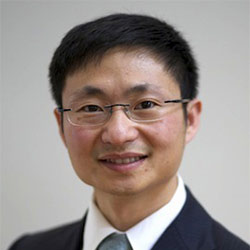Dongning Guo Wins 2023 Bitcoin Research Prize
Guo was recognized for work with collaborator Ling Ren to elucidate a fundamental property of Bitcoin and the underlying Nakamoto consensus protocol.
Northwestern Engineering’s Dongning Guo was awarded the 2023 Bitcoin Research Prize at the Chaincode Labs Bitcoin Research Day event, held October 27 in New York City.
The winning paper, “Bitcoin's Latency—Security Analysis Made Simple,” published in the Proceedings of the Fourth ACM Conference on Advances in Financial Technologies in September 2022, is coauthored by Ling Ren, assistant professor of computer science at the University of Illinois Urbana-Champaign.

“For the past decade, I've been fascinated with Bitcoin and its profound implications on the monetary system, decentralization, and the concept of economic freedom for the masses. Several years ago, I took some risk to pursue this new research area with my PhD student, Jing Li, and later started collaborating with Dr. Ling Ren,” Guo said. “This prize stands as a deeply gratifying testament to the contribution my co-author, Dr. Ling Ren, and I have made to the field.”
Sponsored by Bitcoin research and development center Chaincode Labs, the Bitcoin Research Prize recognizes outstanding research papers — in domains including cryptography, theoretical computer science, network theory, and economics — that advance Bitcoin and the Lightning Network payment protocol. An award committee selects the annual winning paper based on its research impact. Eligible papers must be published in a peer-reviewed venue after January 2019.
“The collaboration with Ling was filled with technical twists and turns and an abundance of enjoyable moments as we overcame one challenge after another,” Guo said. “I consider myself exceptionally fortunate to have had the opportunity to elucidate a fundamental property of Bitcoin and the underlying Nakamoto consensus protocol through the elegance of a theorem.”
Guo explained that, by design, the decentralized Bitcoin mining network allows users to join or leave at any time. Incentivized by mining rewards, honest miners run protocols to validate the transaction information in a blockchain block. Each transaction is approved or rejected by the network via consensus mechanisms.
“It is not unusual for the ledger to fork into competing blockchains that disagree about recent transactions, but the deeper a transaction is in a longest blockchain, the more likely that all honest miners reach consensus about it,” Guo said.
Guo and Ren’s paper resolved a fundamental latency-security trade-off by providing a pair of closed-form formulas to upper- and lower-bound the safety of a transaction as a function of the confirmation depth, the mining rates, and a network delay parameter.
At the Bitcoin Research Day event, Guo introduced a follow-up result that further tightens the upper and lower bounds. He is currently working with a graduate student on the question of whether the gap between the bounds can be eliminated.
“We aim to pin down exactly what is the worst possible attack to Bitcoin and similar systems,” Guo said.

